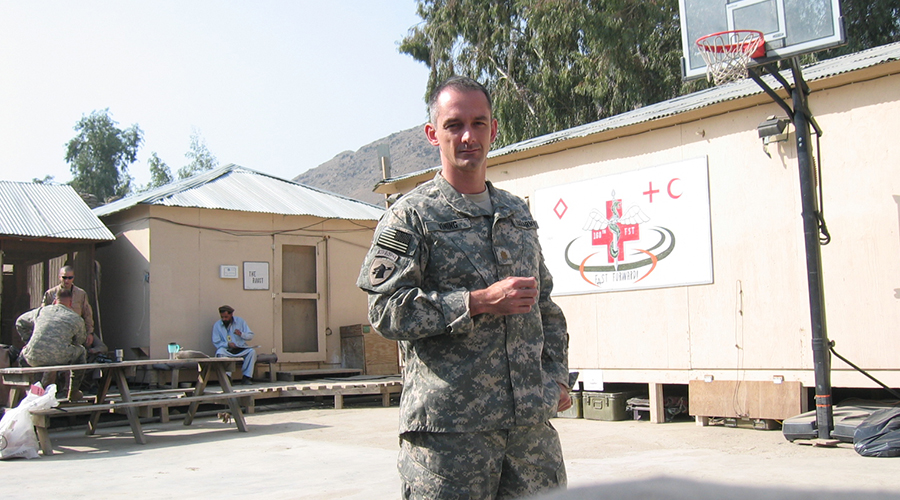Happy Veterans Day
Neil Vining, MD, National Medical Director of TeamHealth Surgical Services, is a veteran and a board-certified, fellowship-trained orthopedic surgeon specializing in pediatrics and trauma. He served in the Army for 22 years and has more than 15 years of trauma medicine experience.
Dr. Vining’s military medical background gives him a unique perspective into how clinicians can think more strategically.
“I think the most persistent impact of my experience is simply providing such a deep sense of perspective,” Dr. Vining explained. “When one has worked through the challenges of military service and wartime service, not to mention those challenges one sees others facing, the trials of the day-to-day seem less overwhelming. The ability to be flexible, to develop a plan and see it through to execution … these are not skills that are exclusive to the military, but they are certainly exemplified in the military.”
Dr. Vining’s four lessons for clinicians
1. Learn from the past
“Those who don’t learn from history are doomed to repeat it,” said George Santayana, a philosopher. There are historical precedents for many of the battles that are fought in the military, and the same is true of medicine. If you study the past objectively and think about how it turned out, you will have a clearer vision of how you should proceed. Don’t repeat other people’s mistakes.
2. Make a plan, but don’t be tied to it
“Plans are useless, but planning is indispensable,” said General Dwight D. Eisenhower. You have to be prepared to accept that your plan might not work. But, the fact that you went to the trouble of developing the plan will prepare you to know where to pivot.
3. Anticipate problems
“Every battle is won before it is fought,” said Chinese military strategist Sun Tzu. If you spend all your energy telling yourself how great your work is, you will believe it. Instead, put your energy into finding the weaknesses and anticipate the problems. Then solve them before they happen. This means realizing your biases and resisting them.
4. Ask for help
Lastly, learn to ask for help when you need it, take care of the relationships that sustain you, and allow yourself the privilege of taking care of yourself when you can. Remember that you are human, even when the situation seems inhuman.
Dr. Vining’s service
He began military service after high school. “The first four years of my career were as an enlisted soldier, serving as a paratrooper at Fort Bragg,” Dr. Vining said. “After that, I went to college and earned my officer commission through ROTC.”
After completing medical school, he came back on active duty. Dr. Vining completed his orthopedic surgery residency at Madigan Army Medical Center. Following his residency, he spent three years as a military orthopedic trauma surgeon at Landstuhl Regional Medical Center, treating wounded military evacuees from the Iraq and Afghan conflicts.
During his time at Landstuhl, Dr. Vining was deployed with the 212th Mobile Army Surgical Hospital in Muzafarabad, Pakistan, for humanitarian relief following the major earthquake there, and again in June 2007, for seven months with the 160th Forward Surgical Team in Afghanistan. After returning, Dr. Vining was the assistant chief of orthopedic surgery at Winn Army Community Hospital.
Upon separating from the Army, Dr. Vining completed an additional year of subspecialty training in pediatric orthopedic reconstruction.
“In both my enlisted and medical careers, I’ve seen a lot of deployed time,” he said. “I’ve spent time in the Gulf, Central America, West and Central Africa, Europe and the Middle East.”
Today, he gives back to military and veteran communities. He works with the Geneva Foundation, a nonprofit focused on medical research for U.S. service members, veterans, their families and communities. He is the chair of the Geneva Scientific Advisory Board and chair-elect of the Board of Directors.
Honoring Veterans at TeamHealth
TeamHealth’s Veterans Affinity Group focuses on representing and honoring veteran employees. We are working on partnering current veteran employees with newly onboarded veterans to help ease the transition from military service to civilian employment.
Another focus area of the group is developing training for hiring managers to analyze resumes and properly conduct interviews of candidates with military service in their background.
Veterans are a great fit at TeamHealth because of our shared values: leadership, integrity and teamwork. Like Dr. Vining, many former service members thrive under pressure and have strong problem-solving skills. They strengthen the company.
“Veterans, be proud. You deserve it, and there is nothing unseemly about taking pride in your service and your sacrifice,” Dr. Vining said. “When people thank you for your service, accept that they really mean it, and let it sink in. Take a moment every day to remember the people who care about you – the people you fought for. Be good to them, and look to them when you need them. None of you should ever feel alone.”
Thank you, veterans.
